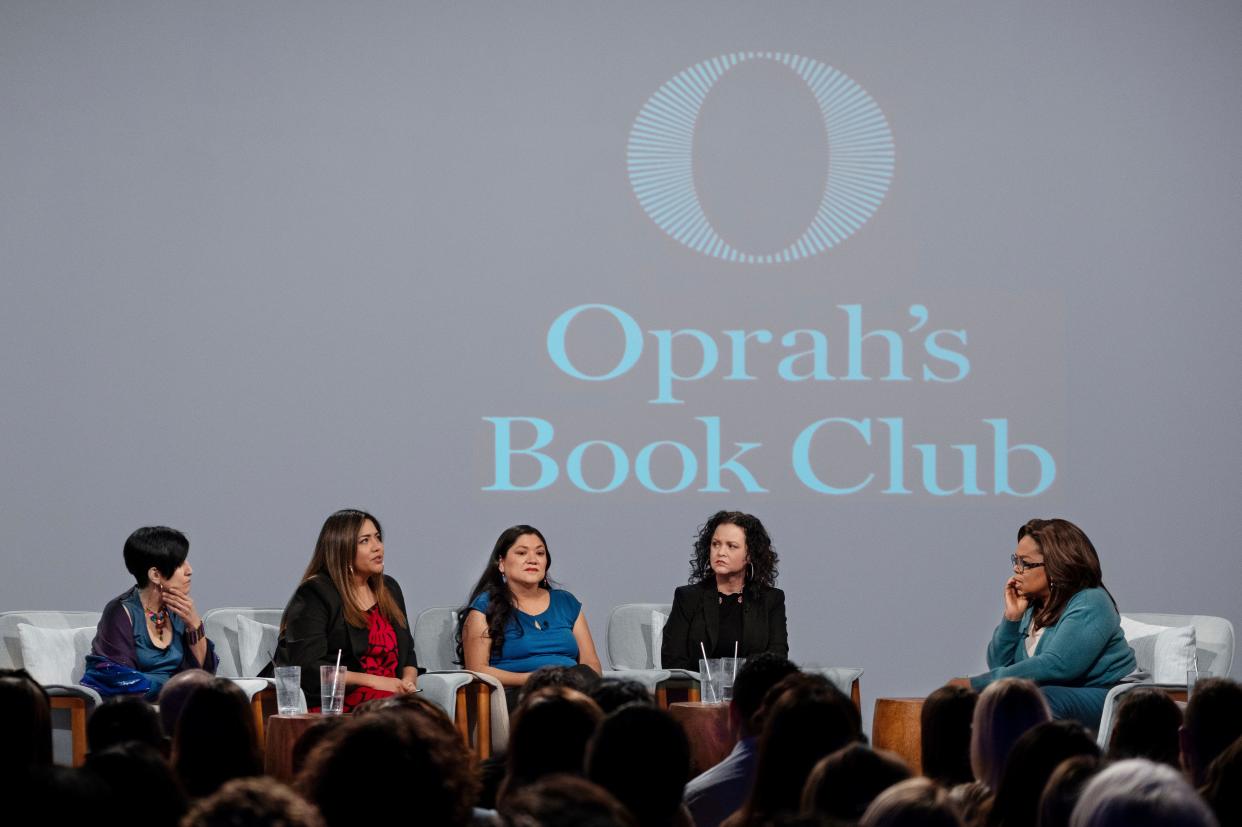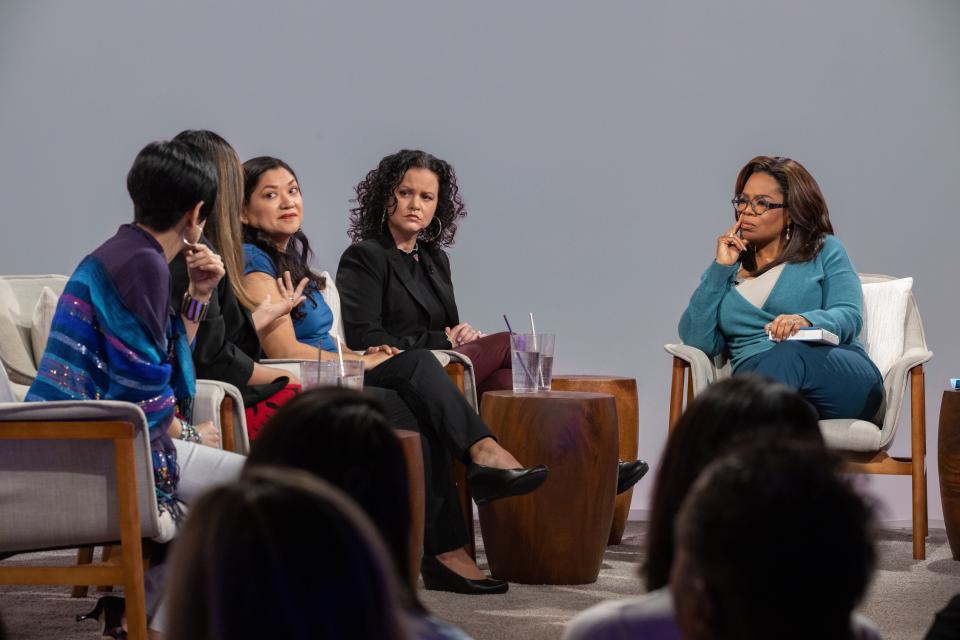Oprah's Book Club tackles controversial 'American Dirt' on Apple TV+ and it's super awkward

Well, that was awkward.
After over a month of steady controversy, Oprah Winfrey and author Jeanine Cummins tackled “American Dirt” in a two-part episode of “Oprah’s Book Club,” now streaming on Apple TV+.
Cummins’ book became a cultural lightning rod upon publication on Jan. 21 and the announcement that Winfrey had chosen it for her book club. The novel is about a Mexican mother and son fleeing to the U.S. from drug cartel-related violence, and was heavily criticized (including in a ★½ USA TODAY review) for what many critics have argued are stereotypical depictions of Mexicans. (Cummins has identified herself as white, and is of Irish and Puerto Rican descent.)
It was a tense month of dialogue on social media, made worse when the book’s publisher, Flatiron, canceled Cummins' book tour, citing security concerns. Things are no less tense on stage at a recorded live event in front of an audience in Tucson, Ariz.
Instead of trying to skirt the controversy, Winfrey decides the only way out is through. “I want you to know I have heard and understand the concerns,” Winfrey says in the episode. “And today, what we’re going to do is lean into this conversation.”
More: Oprah Winfrey dropped 'My Dark Vanessa' book club pick after online controversy
More: 8 books by Latin American authors to read instead of, or in addition to, ‘American Dirt’
What she leans into is unbearable discomfort. Some tension was inevitable, but this is just painful to watch.
Winfrey challenged Cummins with her own words
On stage with Winfrey, Cummins comes across careful and hesitant, choosing her words haltingly. “This isn’t the conversation I anticipated having this week,” she says. “I don’t think anyone who writes a book ever thinks that the critique will become personal. That part has been painful, to have my integrity questioned. It feels a little bit like grief.”
It’s understandable that she would be careful about her word choice considering indelicate phrasing was the source of so much of her book's criticisms.
Cummins defended her decision to write “American Dirt” in an author’s note at the end of the book that only made the controversy more heated. “I was worried that, as a nonimmigrant and non-Mexican, I had no business writing a book set almost entirely in Mexico, set entirely among immigrants,” Cummins writes. “I wished someone slightly browner than me would write it.”
Winfrey presses Cummins on her use of the words “slightly browner,” and Cummins agrees they are “regrettable.”
“I think it was indicative of my own sort of grappling with my identity in these pages, and I never meant to suggest that people haven’t already written their migrant stories,” Cummins says. “I think it was a very clumsy phrase. I wish I hadn’t used it.”
‘American Dirt’ put on trial
To help guide the conversation and provide some necessary perspective, Winfrey invites three Latina writers on stage to discuss their issues with “American Dirt” with Cummins directly: Reyna Grande, Julissa Arce and Esther J. Cepeda. All three are measured and thoughtful, and respectful towards Cummins even when their criticisms are piercing.
The format, however, with Winfrey presiding as judge and Cummins as the accused, makes the conversation feel more like a tribunal with the three panelists doing all of the hard work.
“I felt hurt and I felt undervalued,” Grande says to Cummins of reading “American Dirt.” “Because the publishing industry does not have the same attitude with our immigrant stories as they did with your story.”
After her brief back-and-forth with Winfrey at the beginning, Cummins mostly sits silent and listens. Imagine sitting chastened on a stage while the Oprah Winfrey reads all the mean tweets written about your book in front of a live audience and television cameras for posterity. Your worst day at school could never compare.

Winfrey gets taken to task
Winfrey defends her book club pick, insisting that any book that opens up a pathway of empathy for other people, however imperfectly, has value.
Many audience members applaud her choice. But the panelists don’t let her off the hook.
“You are a king- and queen-maker,” Cepeda implores Winfrey. “How are you going to respond to the call?”
“I will now be on the search personally for more Latinx writers,” Winfrey says.
Arce presses harder, armed with numbers. “Since 1996, there have been zero books in your book club – zero – that have been written by Mexican-Americans,” she says.
Winfrey stumbles a bit. “I haven’t looked for any particular race or for any book. I just look for the book that I particularly like or that someone recommends to me. I will now, that my eyes have been opened to see, behave differently.”
The publishing industry gets the worst of it
Grande, Arce and Cepeda direct their harshest criticisms at the publishing industry as a whole. And sitting in the audience soaking it all up are Don Weisberg, president of MacMillan Publishers, and Amy Einhorn, who edited "American Dirt" after acquiring the book for seven figures in a bidding war.
“My issue is not Jeanine’s book, really. My issue with a publishing industry that systematically silences us by keeping us off the bookshelves,” says Arce. “As a Latina writer, I’m very often asked to make my stories more relevant, and to make them more accessible… When the publishing industry is 80% white, what I’m really being asked to do is to make my stories more relevant to white people.”
Einhorn is eager to direct the fire away from Cummins and make herself the target – for instance, by accepting responsibility for the book’s launch party, where tables were decorated with floral centerpieces wrapped in barbed wire like mini decorative border walls. “It was wrong, it was distasteful,” Einhorn says. “The fact that we didn’t notice is telling about the diversity and what we need to do in publishing.”
Weisberg is less clear. Though he insists his company is taking to foster diversity, he struggles to articulate what those steps are. “We’ve hired strategists, we’ve hired all different sorts of people to figure out how do we become a more diverse and inclusive company,” he says, unsatisfactorily.
Without missing a beat, Cepeda claps back, “Did they tell you to hire more Latinos?” She gestures to herself and the other Latina writers on stage. “We’re right here!”
This article originally appeared on USA TODAY: Oprah Winfrey's Book Club awkwardly tackles 'American Dirt'

